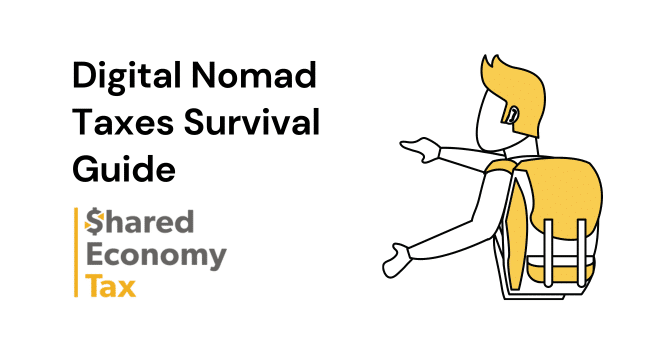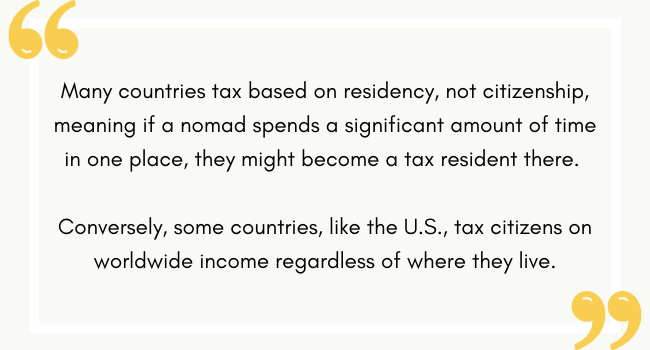Digital nomads have taken the idea of remote work to the extreme. While some may have home bases, some digital nomads have decided to travel the world and have jobs that allow them to stay connected wherever they are. This article explores digital nomad taxes.

Though the idea of the open road and picturesque backdrops for video conferences may be tempting, it’s essential to consider the tax complications that accompany the lifestyle.
Why Understanding Taxes is Crucial for Digital Nomads
Though it may be tempting to work in a location for a while, then move on without giving it a second thought, the taxing authorities have a different attitude towards digital nomads. While living (and working) in various countries, you can create a tax liability in each location you work from.
Many countries tax based on residency, not citizenship, meaning if a nomad spends a significant amount of time in one place, they might become a tax resident there. Conversely, some countries, like the U.S., tax citizens on worldwide income regardless of where they live.
Digital nomads will need to understand they may be double-taxed on income depending on the rules in each country they visit and the tax treaties various countries have established. With a proper understanding of tax treaties, digital nomads can avoid being double-taxed: once in their country of residence and once in their country of citizenship.
Ignorance of tax rules does not make one innocent of tax violations. Improperly reporting your income can result in fines, penalties, and criminal charges depending on the severity of the underpayment.

Tax Residency and Domicile
Tax Residency refers to where an individual is expected to pay taxes, usually based on their duration of stay or income source. It is only sometimes linked to citizenship. In contrast, Domicile is a person’s “home,” indicating where they intend to live permanently.
Each country creates its own definition of tax residency. Many use the “days test,” with individuals becoming tax residents if they stay beyond a specific number of days. Countries like the U.S. factor in citizenship, taxing U.S. citizens on global income, regardless of where they reside.
Understanding Tax Treaties
Tax treaties are formal agreements between two countries to avoid or mitigate the double taxation of the same income. The treaties outline which country has the right to tax specific types of income. The aim is to promote economic cooperation and investment between the two countries, clarify tax rights, and provide a mechanism to resolve disputes.
Tax treaties ensure that countries don’t tax the income twice. For instance, if a digital nomad from Country A works in Country B, the treaty between A and B might stipulate that the income you earn in Country B is only taxes in Country B. Some treaties also have mechanisms where the nomad receives a tax credit in their home country for the taxes paid in the other country.
Income Tax Basics
You use various types of income differently on your income tax.
Employment Income: This is the money you earn as an employee. It includes wages, salaries, bonuses, and other perks. Employers typically withhold taxes from these earnings. In many jurisdictions, employers issue forms at year’s end. They issue forms like the W-2 in the U.S. to employees summarizing their earnings and tax withholdings.
Self-Employment Income: Earned by freelancers, contractors, or business owners, this type of income isn’t subject to withholding. Self-employed individuals are responsible for estimating and paying their taxes, which might include both income tax and self-employment tax.
Passive Income: This comes from sources where you aren’t actively working, such as rental properties, dividends from investments, or royalties from intellectual properties. Tax rates on passive income might differ from other income types, sometimes enjoying more favorable rates (like qualified dividends in the U.S.).
You should track your income throughout the year. You should also understand which tax forms you expect to receive at the end of the year. This ensures that you accurately and completely report your income.
Deductions and Credits Digital Nomads
Digital nomads often have unique expenses and incomes that can qualify for certain tax deductions and credits.
Common deductions include the home office deduction. This allows nomads to deduct a portion of their home expenses (like rent or utilities) if a specific part of their home is exclusively for business.
The travel and meal expense deduction is another common deduction. It allows you to deduct work-related travel costs and a portion of meals during work travel. Note that the travel must be work-related to be deductible.
In the U.S., the Foreign Earned Income Exclusion allows citizens working abroad to exclude a portion of their foreign earnings from their taxable income. This potentially offers significant tax savings. For the Foreign Earned Income Exclusion, U.S. nomads must pass either the Physical Presence Test (proving they’ve been out of the U.S. for at least 330 full days in 12 months) or the Bona Fide Residency Test (showing genuine residency in another country).
Special Considerations for Cryptocurrencies
Cryptocurrencies have surged in popularity and usage among digital nomads, given their borderless nature and ease of transaction. However, they introduce a new layer of complexity in tax considerations.
There is no general consensus on how to tax cryptocurrencies. This means you’ll need to consider the country you are in and carefully plan the timing of your cryptocurrency transactions.
Digital Nomad Tax Planning and Compliance Tips
Digital nomads should proactively manage their taxes by setting aside a portion of their income for potential liabilities.
Maintaining detailed records, including receipts for deductions, is essential for tax planning and potential audits. Understanding tax residency rules and staying updated on cryptocurrency regulations can prevent unexpected tax burdens.
Additionally, differentiating personal and business expenses simplifies tax calculations. Consulting with tax professionals can offer valuable insights tailored to a nomad’s unique financial landscape.
Closing Thoughts on Digital Nomad Taxes
Understanding digital nomad taxes for income types, potential deductions, and international regulations is crucial in navigating the intricate world of taxes as a digital nomad.
From managing cryptocurrencies to leveraging global tax treaties, staying informed and organized can save both money and stress. It’s imperative to comprehend your tax obligations fully; seeking professional advice is always wise when in doubt.
Are you a digital nomad? Not sure what you’re doing with your taxes? Maybe you need some guidance demystifying tax residence and treaties, or just how to file your income tax return. However, we can help. Set up a no cost strategy session with one of our tax pros. We can help you get on track.